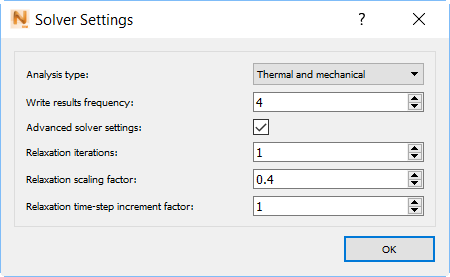
Select the Analysis Type, results frequency, and optionally, advanced settings for relaxation.

Analysis type - Users can perform a thermal only analysis or a full thermo-mechanical analysis
Write results frequency - By default, the results frequency is 1, which means that results files are written for every increment. For particularly long simulations, a higher value will only produce results files every n increments, where n is the results frequency specified. This can reduce the disk space required to complete the simulation. If an output frequency is used that exceeds the maximum number of increments of a given simulation, results files will only be written for the first and last increments.
Relaxation iterations and Relaxation scaling factors - These options are used to control the under relaxation of the Newton-Raphson solver during PRM generation. By default, the values for iterations and scaling factor are different for thermal and mechanical simulations; if you set values here in the Solver Settings dialog, they will apply to both types of simulations, overriding the defaults.
Relaxation Best Practices
- Generally, the default values above should lead to a converged solution.
- If the thermal or mechanical analysis fails, it is recommended that the Relaxation iterations be increased to 2.
- Reducing the Relaxation scaling factor will also aid convergence, but not as effectively as increasing the iterations.
- Increasing relaxation may slow the simulation speed.
- Scaling factors below 0.1 or above 0.5 are not recommended.
- Relaxation iterations above 3 are not recommended.
- If the simulation does not converge using the maximum recommended relaxation, of 3 iterations and a 0.1 scaling factor, there may be problems with the .lsr file or custom material properties.
Time-Step Increment Factor: This controls the time step during processing, which based upon the laser or electron beam radius and travel speed. A value of 1 creates time steps equal to the time it takes to move 1 heat source radius. Using values lower than 1 may aid convergence or increase model resolution. In most cases, using values higher than 1 will produce aliasing in the simulation and will produce invalid results.